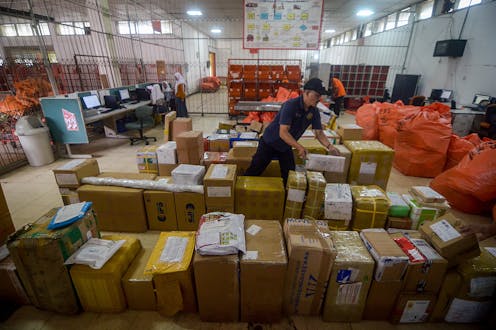
When COVID-19 cases were first found in Indonesia, regional leaders such as Jakarta’s governor set up social distancing and work-from-home policies, closed government office buildings and encouraged companies to implement social distancing and remote working.
As of May 2022, the airborne virus that causes COVID-19 has infected more than 529 million people globally, with more than 6.29 million deaths. In Indonesia, the virus has infected more than 6.5 million people and killed more than 157,000 people.
Four months into the pandemic in Indonesia, in May 2020, the Indonesian Health Ministry released COVID-19 guideline health protocols for organisations.
The protocols aim to guide the transitions of workers (who had been in lockdown) back into their workplaces while still adopting measures to prevent the transmission of COVID-19.
Our research, carried out between October and November 2020, examined how well companies implemented these protocols.
We found organisations faced significant challenges in implementing these guidelines. Problems included conflicting and rapidly changing advice, limited resources and “COVID fatigue” among workers.
Challenges in implementation
We interviewed 12 companies, focusing on agriculture, logistics and goods transportation, construction and manufacturing. These are key industries deemed to have a significant economic impact.
We also interviewed key stakeholders in policy development. They included the Ministry of Labour, the Ministry of Health, the Indonesian Safety and Health Council, the International Labour Organisation (ILO) and the country’s COVID-19 Task Force.
The guidelines recommended organisations set up a task force, implement mask use, hand-washing and social distancing, and trace, track and test to monitor and contain COVID-19 transmission. The guidelines also recommend work-from-home policies and worker education and monitoring.
We found the nature of a business, organisational structure and size, financial resources and geographic location contributed to whether a company could implement these policies better than others.
Well-established large organisations with comprehensive management systems appeared to have been better able to rapidly and effectively implement COVID policies and procedures.
Some organisations implemented rapid testing of all employees and visitors, complementing these with PCR testing. Some organisations did no testing at all.
Most organisations reported they only tested high-risk people (workers who have lots of interactions with clients or people outside the organisation) or carried out tests randomly before testing all workers. Organisations not heavily involved in testing usually reported being limited by the cost.
The companies stated they follow the health protocols for several reasons: to comply with the government’s directive, to ensure business continuity by keeping workers healthy at work, to follow top management’s commitment, or in the case of subsidiary organisations, as a response to the parent company.
They also shared that unclear directions from government agencies, including differences in directives from varying levels of government and across regions and sectors, and short notice of rapid changes in directives made it difficult for organisations that operated at a national level to implement these health protocols.
Organisations also cited poor worker awareness and compliance. They reported “COVID fatigue” among workers, making it challenging to continue being vigilant. They also encountered problems in getting workers to comply with health protocols.
And, finally, they reported having to combat misinformation, obtained from social media and other sources, spreading among workers.
Companies also mentioned limited resources to implement desired or required actions. For example, some have limited floor space to implement social distancing, limited funds to provide rapid testing, masks, hand-washing stations and thermometers, and little time to carry out testing, education or training and paperwork.
Workers also still use public transport to get to work and to travel to meet clients, family and other members of the community, exposing them to risks of infection.
Financial impacts
Some companies experienced reduced income, but not all.
The construction and manufacturing sectors reported income losses due to lower demand for their services or products. In contrast, the agricultural sector participants reported either no economic impacts or increased demand for their services.
Three logistics companies reported that the pandemic impacted their productivity, in some cases very severely. But all had pivoted to new and emerging markets, such as e-commerce, leading to greater use of courier services. They have sustained their businesses and are surviving financially.
The majority of participating organisations noted the pandemic had required them to harness new technology. Many pointed out that the use of new technology improved their productivity.
What can we learn from this?
Although the multi-agency approach has advantages in securing support from all key players, it contributes to a lack of clarity. In communicating measures to contain COVID-19 transmission, key agencies should co-ordinate and integrate their efforts to ensure more consistent messaging.
Policymakers should consider additional schemes to provide funding and other resources to help organisations (particularly SMEs) comply with the health protocols.
Policymakers should also facilitate the ongoing education of the general working public. In particular, there should be a focus on exploring new ways to counteract COVID fatigue.
This research was funded by the Australian government through the Australia-Indonesia Centre under the PAIR program
The Australia Indonesia Centre supports The Conversation Indonesia in the production of this article.
Helen Brown adalah anggota Dewan Bisnis Australia Indonesia (AIBC). Dia adalah Managing Director Bisnis Asia yang menerima dana pemerintah Australia untuk penelitian investasi asing bekerja sama dengan CIPS Indonesia. Dia bekerja untuk Australia-Indonesia Centre, yang didanai oleh pemerintah Australia.
Margaret Cook does not work for, consult, own shares in or receive funding from any company or organization that would benefit from this article, and has disclosed no relevant affiliations beyond their academic appointment.
This article was originally published on The Conversation. Read the original article.







